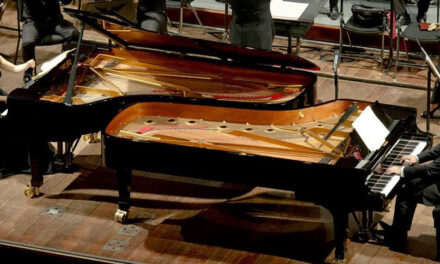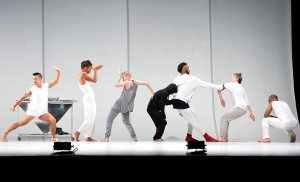Using a scant seven actors in front of a full orchestra and chorus, PlayMakers Repertory Company and the North Carolina Symphony combined to present what this reviewer would call a masterstroke of musical theater. Taking from the massive canon of Wolfgang Amadeus Mozart, the NC Symphony plays a total of fourteen works in and amongst the concert staging of Peter Shaffer’s Amadeus. To actually hear the music of the play as it was heard by the composer himself, and as Antonio Salieri heard it, springing from the written page, is a musical feast unparalleled by just a performance of the play. To hear this music played as it was written at the time places us within the nineteenth century, when concerts were the only way a patron might hear this music. And it gives a powerful and colossal groundwork on which to build this masterful game of power, love, and struggle.
PlayMakers reprises the performance of its 2008 blockbuster to pair with the NC Symphony. This presents us with Ray Dooley as Salieri, Janie Brookshire as Frau Constanze Mozart, Jeffrey Blair Cornell as Baron van Swieten, and Jeffrey Meanza as Count Orsini-Rosenberg. Joseph Haj again directs, but this time he also plays Emperor Joseph II of Austria, under whose auspices both Salieri and Mozart produce their musical canons. Making his PRC debut, Michael Urie of New York recreates Wolfgang Mozart, a brash youth whose musical talents and seeming lack of manners both befuddled and astonished his contemporaries. The cast is rounded out by Matthew Garner as one of the two “spies” Salieri maintained in order to keep his ear to the ground as to the goings-on in Vienna.
The action takes place before, and in and among, the full North Carolina Symphony and the NCS Chamber Choir, formed for this event by Susan Klebanow of UNC-Chapel Hill.. As Mozart and Salieri spar, Music Director Grant Llewellyn conducts each work as it is introduced by the actors. Thus a total of fourteen separate works by Mozart are given voice by full orchestra and chorus, exactly the way Salieri and Mozart would have expected their music to be performed. “Masterful” does not begin to describe this truly awe-inspiring method of presentation.
In his efforts to thwart his seemingly vengeful god, Salieri becomes intimately involved with both Mozart and his family; he is given the opportunity to peruse many of Mozart’s manuscripts. It becomes apparent to him that Mozart merely “transcribes” to paper completely finished works fully composed in his head. At one point, in awe, he tells us, “displace one note, and the music is diminished; one phrase, and the entire structure would fall.” Salieri’s purgatory springs, he tells us, from the ability to hear and understand the massive genius of his rival while being wholly unable to match him on any level. We are treated to the actual music in question precisely as it is discussed.
Soprano Jodi Burns sings two works: “Martem aller arten” from The Abduction from the Seraglio, K.384, and the Kyrie from movement 1 of the Mass in C Minor, K.417a (427). We hear the vengefulness of Mozart’s father in Don Giovanni, and the sweet forgiving spirit of his father’s ghost in The Magic Flute.
Mozart’s masterful The Marriage of Figaro dominates Act 2. Baritone Jason McKinney sings “Non plu andrai” before being joined by other members of the choir to perform the Act II finale, a septet among Count Almaviva (McKinney) and Marcellina (Tamsin Simmill), Basilio (David Wiehle), Antonio (Lewis Moore), the Countess Almaviva (Elizabeth Byrum Linnartz), Bartolo (Nicholas G. Nguyen), and, of course, Figaro (DeMar Austin Neal IV). This thrilling performance gives a power and impetus to the play that even a fully staged production could never provide.
This combined presentation of Mozart’s life and works goes well beyond the game of cat-and-mouse that Salieri imagines takes place between the two composers. It is a colossal collage of Mozart’s life and work, as told by his “rival,” who, within the pages of the play, at least, is Mozart’s worst, and best, critic. Salieri sees clearly the amazing talent of Mozart, his skills, and his inspirations. Mozart wrote into his music that which he experienced in life, and turned what must have been a terrible existence into a centuries-spanning legacy of beautiful and powerful music. This presentation has given those who were able to witness it a far clearer understanding of the composer than either the play, or a concert, alone could ever provide.
This program will be repeated on the afternoon of December 5. For details, see our calendar.












